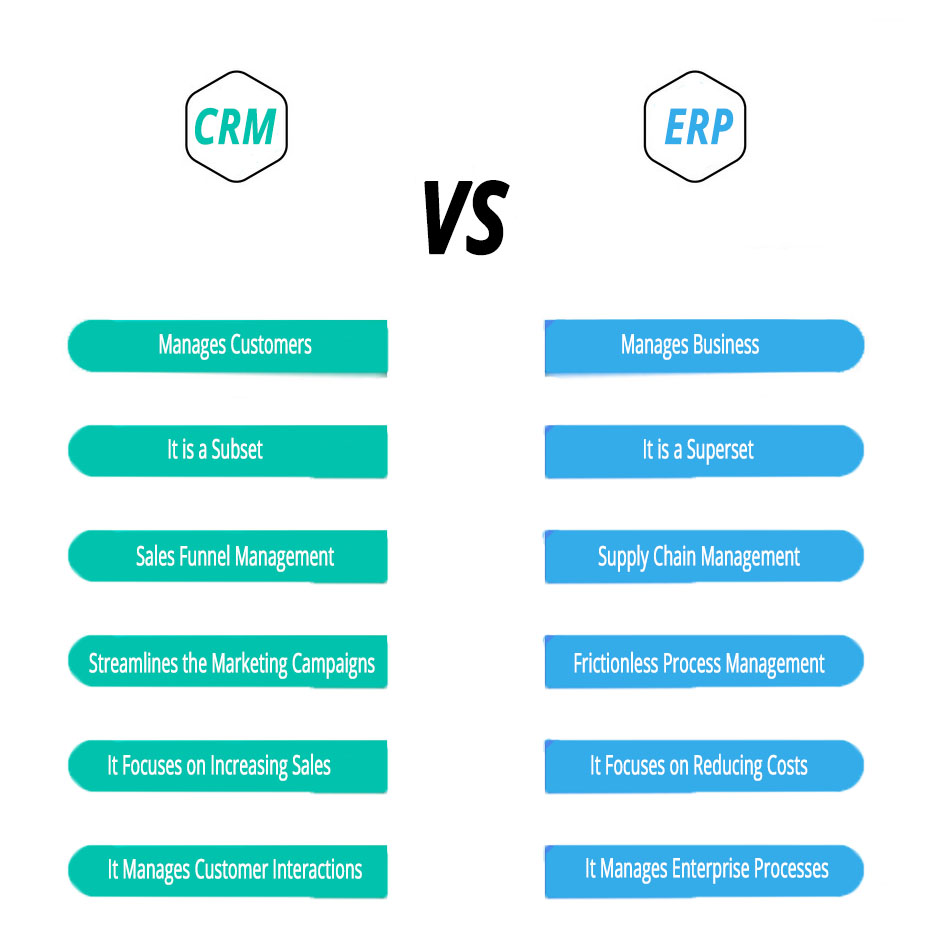Customer Relationship Management (CRM) and Enterprise Resource Planning (ERP) are two terms that are confused to be similar in many ways. Though it is actually the case that purpose, nature, interests, and the ultimate goal of using any of these platforms are for businesses to enhance profitability, introduce efficiency, and increase business revenue.
The article covers a detailed discussion regarding the difference between CRM and ERP with respect to certain parameters and dynamics in an organization.
What is Customer Relationship Management?
CRM system in its simplest allows organizations to gracefully manage all the interaction with both old and new customers. CRM software is used to give a centralized view of all the customer data. Moreover, it helps organize, edit, analyze, synchronize, and automate the processes of sales, customer service, marketing, and segmentation.
What is Enterprise Resource Planning?
ERP system manages a business. It allows businesses to improve efficiency among processes. From frictionless sharing of data among departments to management, ERP develops a consolidated platform. Automated alerts in an ERP system help businesses immediately recover from potential issues that could affect business performance in any way.
Difference between CRM and ERP
The ultimate goal of both platforms is the same; high customer acquisition, customer retention, productivity, reduced churn rate, business revenue, and enhanced performance.
The key differences between CRM and ERP are below:
Features of CRM:
- A CRM system manages the several running marketing campaigns, their dynamics, results, and evaluation based on the customers onboarded in a particular time span.
- It ensures seamless sales funnel management by addressing each lead and evolving it throughout the pipeline and standard procedures.
- Predictive analytics incorporated in the CRM platform gives a statistical view of the website traffic, customer revisits, churn rate, consumer behavior, and similar useful attributes.
- CRM streamlines the sales process by assisting salespeople in managing all sales data, scheduling meetings, and calls with customers in an organized manner.
- The software gives excellent customer service to entertain the queries of customers rapidly without any delay.
- SaaS reporting is incorporated in CRM software that gives a unified report of business performance in a certain time span. Thus it helps businesses employ valuable insights to make dynamic strategies for growth.
- CRM gives a centralized view of all customer data which help sales executive to deal with customers according to their interests. Moreover, it helps them acquire customers more easily.
- AI-enabled analytics forecasts the business revenue that could be improved by dynamically changing strategies or marketing campaigns. It helps by giving insights that in which campaign more investment is required that could yield exceptional results.
CRM has developed a new area of enhancing customer experience in an organization. It helps deals with all the direct and indirect perspectives that could optimize the user journey. This results in customer acquisition and retaining the old ones by scheduling regular follow-ups, offers, and discounts in order to build a strong clientele base.
Read More: What are the Advantages of CRM for your Business?
Features of ERP:
- A scalable ERP system monitor and manage the whole distribution process of an organization.
- It ensures seamless supply chain management and resource allocation for a streamlined workflow.
- ERP manages the finance and accounting department and improves accuracy in the modules.
- It helps automate the employee life-cycle by keeping all employee data and updating status accordingly.
- ERP ensures cost-effective solutions by reducing production costs to a significant extent.
- It manages the human resources to streamline the process of recruitment and hiring in a frictionless manner.
- ERP helps in the process of payroll management in an organization.
ERP software collects a plethora of information from various departments and establishes a unified view in order to efficiently keep records. It integrates the key areas operational in an organization into one platform. The areas include accounting and finance, leads, sales, human resource, inventory, manufacturing, etc.
Read More: ERP Software for Automotive Industry
CRM and ERP systems are getting advanced with the advent of time. Intersected with high-end technologies such as Artificial intelligence and caching learning, they are shifting the paradigm of the operational infrastructure of businesses. Thus, the pace is exponential and technological adoption ensures giving a competitive advantage to businesses.

